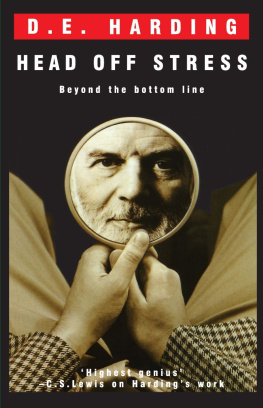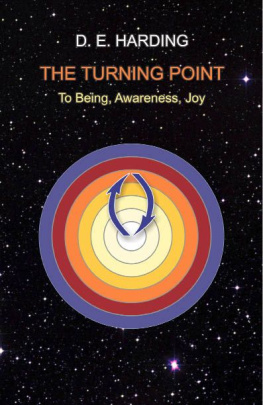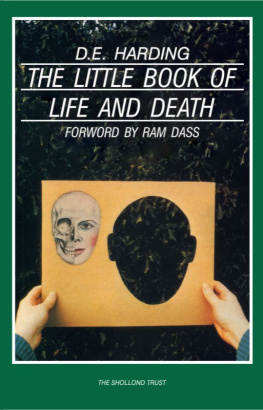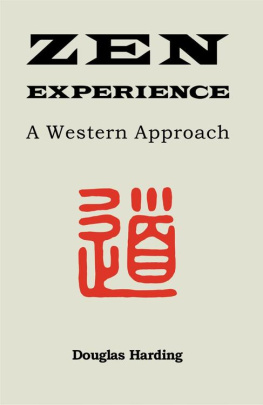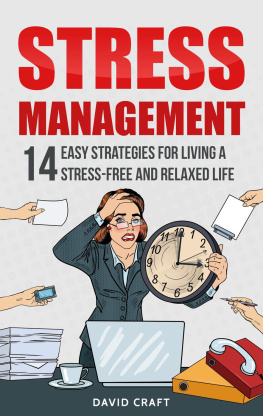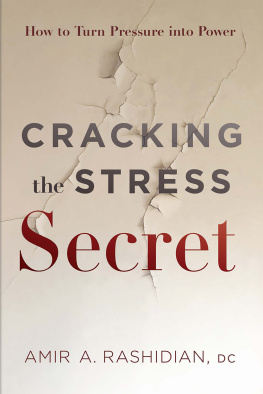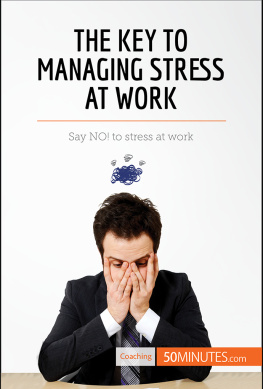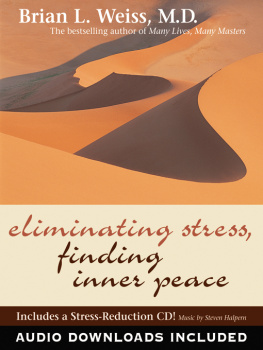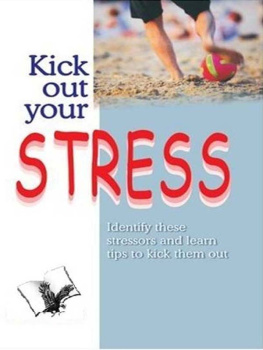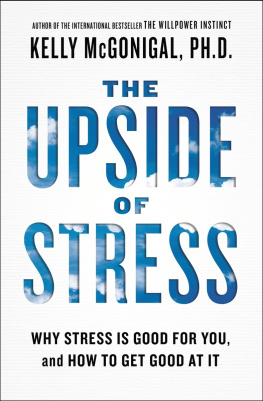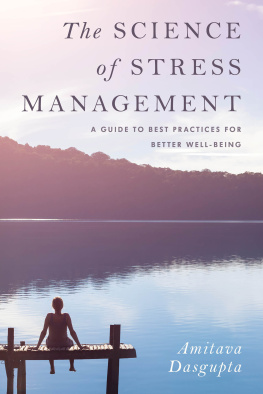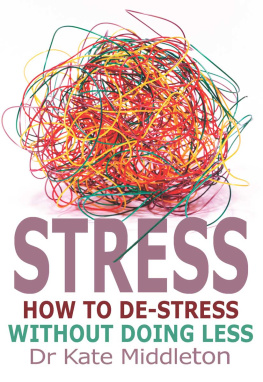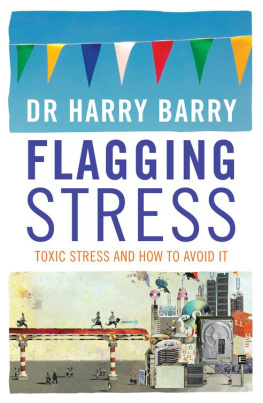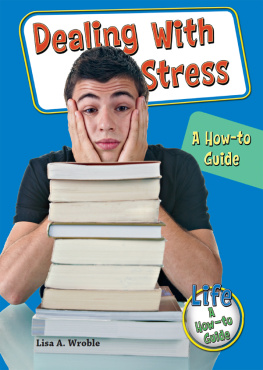HEAD OFF STRESS
Beyond the bottom line
D. E. Harding was no blinkered specialist. While a partner in a flourishing architectural practice, he taught comparative religion for Cambridge University. While a wartime major, he developed a unique means to spiritual enlightenment. He described his field as the meeting-place of psychology, physical science, philosophy and religion. His published works include a whodunnit, a philosophical treatise that took eight years to write. books on religion and the arts of living and dying and articles in the Transactional Analysis Journal, Architectural Review, Middle Way and the Saturday Evening Post. Ann Bancroft's 20th Century Mystics and Sages has a chapter on Harding as 'the man without a head' - a reputation which the Incredible String Band helped to establish with their Douglas Harding Song. Harding invented unique experiments for testing his hypothesis that we are not what we look like, and travelled the world sharing 'the headless way' - the way of seeing Who you really are. Harding died in 2007 at the age of 97.
D. E. Harding
HEAD OFF STRESS
Beyond the Bottom Line
With illustrations by the author
THE SHOLLOND TRUST
To Norm Taylor, who made me write this book
Published by The Shollond Trust
87B Cazenove Road
London N16 6BB
England
headexchange@gn.apc.org
www.headless.org
The Shollond Trust is a UK charity, reg. no 1059551
First published by Arkana 1990
Copyright The Shollond Trust 2009
All rights reserved. No part of this book may be reproduced or utilized in any form or by any means, electronic or mechanical, without prior permission in writing from the publishers.
Printed in the United Kingdom by Lightning Source UK Ltd, Milton Keynes
Conversion to ebook by www.wordzworth.com
ISBN 978-0-9554512-9-4
TABLE OF EXPERIMENTS
PREFACE
This is a wide open book. It makes its point from the start: so that if, on the first reading, you find yourself held up halfway, you will nevertheless have got the point and missed nothing essential. In fact it is possible to get the gist of the message without opening the book at all, just from the cover.
It's like a swimming pool. Venturing in the shallow end, you can enjoy splashing about there; or go in waist-deep and swim a few strokes; or further in and swim strongly; or all the way to the deep end where you can swim underwater, or dive in from the highest board, without ever touching bottom. But the water - the hydro-therapeutic effect of it - is the same from end to end and from top to bottom. So don't worry if you find yourself happy only in the shallow end to start with: stay there as long as suits you, before venturing deeper.
Why (you may ask) if it's all made clear at the beginning, should I bother to write the last chapters, or you bother to read them? Because they are about how to apply and to live the discoveries made in the earlier ones. The anti-stress work advocated in this book is so simple and so easy that you can't do it wrong, and it's so searching that the therapy starts right away; but it is not so easy to keep up. See how you go, and remember that the ingrained habits of the stressful life aren't erased overnight. There's work to do - the most enjoyable I know - but it's indispensable.
That's why I must add: if you are held up halfway through this book - say, at the end of Part Two - don't leave out Part Four at the end of the book, which is about daily practice. Following that practice will help you go back and tackle Part Three - unstressfully.
PART ONE
BASIC PRINCIPLES
There is nothing like looking, if you want to find something.
J. R. R. Tolkien (Thorin speaking, The Hobbit)
The ignorant reject what they see but not what they think. The wise reject what they think but not what they see.
Huang-po
Sit down before the fact as a little child, and be prepared to give up every preconceived notion; follow humbly wherever and to whatever abyss Nature leads, or you shall learn nothing.
T. H. Huxley
The aspects of things that are most important for us are hidden because of their simplicity and familiarity.
Ludwig Wittgenstein
1
Your Role and My Role
Long ago, the secret of transport turned out to be the simplest of all inventions - the wheel. Later on, the secret of mathematics turned out to be the simplest of all ideas - zero. In much the same way, the secret of the stress-free life turns out to be the simplest of all experiences - simple to point out, simple to get, simple to share, simple to renew. As, in the course of the next few pages, you will find out for yourself.
Your job will be to observe three rules:
The first is that you carry out the tests, the easy experiments I'm going to ask you to do. If you just read about them nothing will happen and you will be wasting your time.
The second is that you go by what you find, that you take seriously the results of the experiments. This means ignoring, at least for the duration of each test, things you have been brought up to believe, and looking for yourself. It means starting from scratch and trusting your own findings. It means being prepared for the discovery that you are more fortunate than you had ever dreamed of. I shall tell you exactly how to carry out the experiments. But they are all about you, and the ultimate authority on you is - YOU. Just do what I ask, take heart and be open to yourself, and you can't go wrong.
The third rule is that you realize your gains, and make use of them. This means drawing on the anti-stress capital that is yours from the start. If you just let it lie there in the bank and refuse to write cheques on it, so to speak, you will go on living the life of a pauper - and one who is all the more stressful because, deep down, he knows that his poverty is self-inflicted. In plain language, take advantage of your discoveries, and be kind to yourself.
Please do your best to observe these three rules. For my part, I will show you how to get rid of stress, by a method that has five features:
It takes no time to learn.
At once you see what to do, and how to do it.
You can't do it wrong.
The switch-over to no stress is instant.
Afterwards, if you think you have lost the knack, you are wrong. It has lost you: your attention has been diverted.
To dump stress - what a prospect! But even before we start on the job this raises the question: 'If a life without stress means a life without problems, a perfectly peaceful existence - is this what I really want? Won't I be bored stiff (or bored flabby?) with nothing left to stretch me? In fact, won't I just be exchanging the stress of the troubled life I live now for the worse stress of unrelieved dullness and ennui?'
This book takes care of and resolves the contradiction between our desire on the one hand for a peaceful life and our desire on the other hand for excitement and adventure. In addition to its main guarantee of instant access to the Land of No Stress, is the assurance that you will miss none of the challenges, the thrills and the spills of the Land of Stress.

